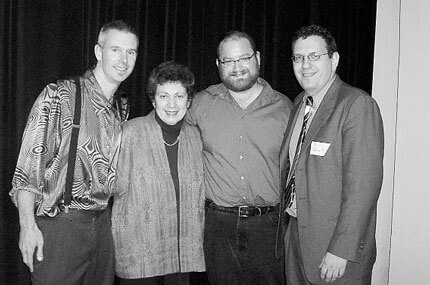Triangle Awards honor gay and lesbian literature at New School event
More than 150 people turned out on the evening of May 12 for the 16th annual Publishing Triangle Awards honoring gay and lesbian fiction, nonfiction, poetry, and playwriting. Attendees included major publishers and literary agents such as the poets and writers Minnie Bruce Pratt, Christopher Bram, Joan Nestle, and Marilyn Hacker.
The awards ceremony is a joint effort of the Publishing Triangle, the Ferro-Grumley Awards, and the Robert Chesley Foundation, are the only gay and lesbian writing awards that include cash honorariums, which range from $250 to $3,000.
Historian David Carter, author of the forthcoming “Stonewall: The Riots That Sparked The Gay Revolution,” spoke of the importance of focusing on gay and lesbian writers, since “our own community doesn’t tend to recognize the richness of our history and literature, too often falling into the trap of being mesmerized by celebrity culture.”
Historian Lillian Faderman was the evening’s big award winner, picking up the Whitehead Lifetime Achievement Award and the Judy Grahn Award for Lesbian Nonfiction for “Naked in the Promised Land.” Sarah Van Arsdale, an award judge, called the book a “personal memoir and social history that is also so full of sex and gossip that you can’t put it down.”
Emphasizing the importance of Faderman’s continuing project to document lesbian history in both popular and academic writing, novelist and presenter Sarah Schulman observed that “many lesbians probably now know, in a very watered-down and generalized way, that they have existed in the past. But they may call that past ‘Ellen.’ Our real lived experience, past and present, is not reflected in popular or public culture.”
John D’Emilio’s “Lost Prophet: The Life and Times of Bayard Rustin,” a biography of the King-era anti-war and civil rights activist, won the Randy Shilts Award for Gay Nonfiction. Publishing Triangle co-chair Trent Duffy said the biography represents an encouraging trend in gay nonfiction, since “even ten or 15 years ago it would have been harder to publish such a major work about [a black, queer radical].”
Despite such advances in some genres, Schulman drew attention to the fact that “gay and lesbian fiction is in a crisis because it is no longer being published by mainstream publishing houses.” Faderman agreed, connecting the dearth of gay titles to the recent “loss of literally hundreds of feminist and gay and lesbian bookstores.”
In contrast, Ferro-Grumley chair Stephen Greco emphasized that “the market for our work is incredibly strong, even if the mainstream publishing houses are too timid to capitalize on it. They are missing a huge opportunity that smaller and less conventional houses are taking advantage of. What’s more, the work at these smaller houses is richer than ever.”
One such novel recognized during the evening was “Southland” by Nina Revoyr, which was awarded the Ferro-Grumley Award for Lesbian Fiction. Stephen Greco described Revoyr as “like some of the ambitious writers from the 30s and 40s writing the great American novel, though for her that novel is a multi-generational romp through multicultural Los Angeles.”
In the men’s category, Trebor Healey’s lyrical coming-of-age tale “Through It Came Bright Colors” won the Ferro-Grumley Award for Gay Fiction in something of an upset, beating acclaimed novels by Christopher Bram and John Rowell.
Trent Duffy said that “it was very touching to hear Brian Teare’s friends squeal in surprise” when he was declared the recipient of the Triangle Award for Gay Poetry for his collection “The Room Where I Was Born.” In his acceptance speech, a visibly moved Teare, who also recently won the prestigious Brittingham Poetry Prize, attested to the special meaning for him of the Triangles.
“Being from a really small town in Alabama, my idea of being a gay man was developed throughout my youth solely through literature,” he said.
The winner of the Audre Lorde Lesbian Poetry Award was “Final Girl” by San Francisco performance poet Daphne Gottlieb.
The Chesley Foundation recognized two playwrights. Jane Shepard won the emerging playwright award, while Rebecca Ranson won the lifetime achievement award. Ranson has written more than 30 plays, including “Warren” and “Lavender Hearts,” and has addressed issues ranging from the AIDS crisis to her own Southern childhood.
A special non-literary Leadership Award honored Barbara Gittings, whose decades-long work at the American Library Association and groups such as the Daughters of Bilitis has been devoted to increasing access to gay and lesbian writing.
The Publishing Triangle and the Ferro-Grumley Foundation announced new fundraising initiatives and the Chesley Foundation announced a project to publish the work of its winners. Greco said that “our community has proven itself in terms of fundraising for health, youth, and other political needs, probably because they are more like emergencies, but I would like to see a successful initiative supporting gay and lesbian writing, because what permanently drives culture and what has been our biggest impact on the culture at large are the arts.”
Poet and nominee Minnie Bruce Pratt said the evening was a success, arguing that the Triangles are “more important than ever during this period of so much right wing pressure to deny the beauty and importance of queer lives.” Schulman concurred, adding that “a lot of lesbian and gay writers are dropping their queer content, so anyone who is still out in their work is a hero to me.”



































